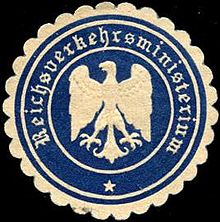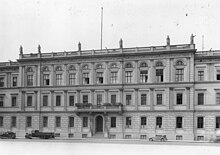Reich Ministry of Transport
| Reichsverkehrsministerium (RVM) (German) | |

RVM official sealing stamp prior to 1935
|
|
 RVM headquarters in Berlin, 1937 |
|
| Agency overview | |
|---|---|
| Formed | March 13, 1919 |
| Preceding |
|
| Dissolved | May 23, 1945 |
| Superseding agencies |
|
| Jurisdiction | Germany |
| Headquarters |
Voßstraße 34/35, Wilhelmplatz, Berlin-Mitte 52°30′38″N 13°22′58″E / 52.51056°N 13.38278°ECoordinates: 52°30′38″N 13°22′58″E / 52.51056°N 13.38278°E |
| Employees | 1.5 Million (1943) |
| Minister responsible | |
| Agency executive | |
| Child agencies |
|
The Reich Ministry of Transport (German: Reichsverkehrsministerium or RVM) was a cabinet-level agency of the German government from the founding of the Weimar Republic through the end of the Third Reich (1919–1945). Formed out of the Prussian Ministry of Public Works after the end of World War I, the RVM was in charge of regulating German railways, waterways, and the construction industry - a kind of infrastructure agency in today's understanding. During this period the German National Railway (Deutsche Reichsbahn) was organized as an independent state-owned company to guarantee that Germany paid war reparations according to the provisions of the 1924 Dawes Plan. Therefore, during its early years the RVM was primarily responsible for aviation, road transport, inland waterways and maritime shipping. In the rail sector its involvement was limited to administrative and technical supervisory functions.
During the Third Reich, the Ministry expanded exponentially as state railroads, transportation-related associations and even private transport companies came under the Nazi government's direct control. The Deutsche Reichsbahn, not only Germany's largest public asset but also the largest enterprise in the capitalist world at the time, was taken over by the Ministry in 1937.
The Ministry grew further during World War II, taking over agencies in conquered nations as well as providing military rail transport behind combat zones. It also became responsible for the deportation of European Jews to the extermination camps. The particular unit involved, known as "No. 21. Bulk Transport", functioned in close cooperation with the SS Reich Main Security Office. The RVM therefore came to play a pivotal role in the Holocaust. After the war the Ministry lived on for a time in the Flensburg Government and was dissolved de facto at the end of May, 1945.
...
Wikipedia
